Because I am a great big geek, one of my personal goals is to read all of the novels inspired by Buffy the Vampire Slayer. This is the first in what will be a series of posts collecting reviews of these books in a somewhat shorter-than-usual format. In this installment: Afterimage, Bad Bargain, Blooded, Carnival of Souls, One Thing or Your Mother, and Portal Through Time. All are set during the show’s second season.
Afterimage by Pierce Askegren
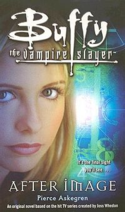 I’m pretty sure Afterimage is set between “What’s My Line” and “Ted”—the former is a definite, despite the season being referred to as early autumn even though “What’s My Line” takes place after Halloween, but the latter is a guess based on a couple of thoughts Joyce has about needing to get out more, which the author (writing in 2006) might’ve intended as a lead-in to “Ted.”
I’m pretty sure Afterimage is set between “What’s My Line” and “Ted”—the former is a definite, despite the season being referred to as early autumn even though “What’s My Line” takes place after Halloween, but the latter is a guess based on a couple of thoughts Joyce has about needing to get out more, which the author (writing in 2006) might’ve intended as a lead-in to “Ted.”
The book gets off to a slow start and, in fact, not much seems to happen for the first sixty pages. Our heroes encounter some strange folks about town, and it’s pretty obvious to the reader that “Hey, these are characters from the movies being shown at the new drive-in!” but it takes quite a while for the characters to catch up. That said, around page 100 things begin to improve, which is right about where Jonathan appears. I knew he was in this, and was hoping for more of an active role. Sadly, all he does is go to the movies with Xander and then get afflicted by a mysterious sleeping sickness, along with 29 other Sunnydale residents.
Speaking of the drive-in, it occurred to me that this is totally a Sailor Moon plot. Creepy yet charismatic bad guy comes into town and advertises a free drive-in. The local residents swarm the place and then creepy guy feeds on their energy. Our heroine destroys the evil projector with her tiara machete, and the bad guy dissolves. He does not, alas, proclaim “Refresh!”
Still, this was a pretty enjoyable outing, and had some nice touches, like a glimpse at Xander’s bickering parents, a spot-on depiction of petulant Harmony, and Cordelia demonstrating her intelligence and leadership skills. In fact, while Buffy is important, I think Xander comes across more like the protagonist of this one, which is a nice change.
Bad Bargain by Diana G. Gallagher
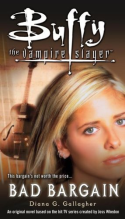 Bad Bargain is set in season two (between “What’s My Line?” and “Ted” would be my guess) but written in 2006, three years after the end of the series, which allows author Diana G. Gallagher to use her knowledge of later events to color what would otherwise be a fairly dull tale of demonic critters infesting a rummage sale.
Bad Bargain is set in season two (between “What’s My Line?” and “Ted” would be my guess) but written in 2006, three years after the end of the series, which allows author Diana G. Gallagher to use her knowledge of later events to color what would otherwise be a fairly dull tale of demonic critters infesting a rummage sale.
In another of her attempts to recapture a normal teen life, Buffy is volunteering at the school rummage sale to benefit the marching band. She’s roped Willow and Xander into participating, too, and this scintillating event has even come to the attention of Spike and Dru, who head to Sunnydale High for a spot of shoplifting. All goes awry when a spell to locate one kid’s missing amulet ends up inviting a host of microscopic Hellmouth beasties, who proceed to infect most of those present. The day is ultimately, of course, saved, though Willow theoretically suffers trauma from being parted from the cute-looking critter who beguiled her into becoming its protector. That part is kind of dumb (and I didn’t think Gallagher captured Drusilla’s mode of speech well, either).
What’s interesting, though, is that Andrew is in this. In fact, he and Jonathan have fairly prominent roles, which I thought was quite fun. In a nice bit of dramatic irony, Jonathan has become possessed by some demonic whip thing and subsequently angsts when he realizes that he nearly killed his best friend. In addition, Gallagher includes a few comments that suggest that these events spurred actions by the characters as seen in the show. For example, Oz muses about painting his van and, after the pests have been sent back where they belong, Princpal Snyder remarks, “Next year’s fund-raiser for the marching band will be something simple, like selling candy.” Hee!
Blooded by Christopher Golden and Nancy Holder
 It’s difficult to pinpoint the timeline for this one. Angel’s stint as Angelus is mentioned, as is the death of Jenny Calendar, but he was apparently able to regain his soul in a way that did not involve Willow. (This book was published in August 1998, and I have to wonder if Whedon wasn’t willing to give away the plot details for the season two finale, so Golden and Holder had to be super vague about it.) I do think this is the end of season two—despite what Wikipedia claims—because Oz and Willow’s relationship is still new, her hair is still long, etc.
It’s difficult to pinpoint the timeline for this one. Angel’s stint as Angelus is mentioned, as is the death of Jenny Calendar, but he was apparently able to regain his soul in a way that did not involve Willow. (This book was published in August 1998, and I have to wonder if Whedon wasn’t willing to give away the plot details for the season two finale, so Golden and Holder had to be super vague about it.) I do think this is the end of season two—despite what Wikipedia claims—because Oz and Willow’s relationship is still new, her hair is still long, etc.
Anyway, the gang goes to a museum for a field trip and Willow ends up freeing and being possessed by the spirit of an ancient Chinese vampire-sorcerer. She gathers minions, attacks Xander, and causes her friends to fret. Eventually, Xander gets possessed by a Japanese mountain god and there’s a big battle and spells and Giles wears a headband with a kanji on it. In the end the day is saved through teamwork (yes, really).
On the whole, this book is pretty boring. However, there are a few things to recommend it. For every two or three bits of clunky dialogue, there is occasionally one that is at least slightly amusing or which I can easily hear in the actor’s voice. It was also prescient about a few things. Cordelia’s lack of skill as an actress is mentioned, which will come into play on Angel, and she makes the comment, “I’ll never admit it if you tell her I said it, but I’d hate to think about what Sunnydale would be like if we didn’t have a Slayer in town.” This is interesting, because she is the one who allows us to see exactly that in season three’s “The Wish.” There’s also some good stuff here with Willow’s desire for power and strength, and how that made her vulnerable to the vampire-sorcerer dude. Most of the resulting darkness is played as his fault, but it dovetails nicely with her eventual character arc on the show.
In the end, there are far better Buffy tie-in books, but this wasn’t too bad.
Carnival of Souls by Nancy Holder
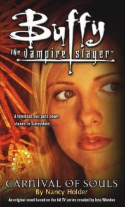 Carnival of Souls turned out to be a lot better than I was expecting. Wedged snugly between “Ted” and “Surprise,” the story is set around the episode “Bad Eggs,” which is a great place to put it because, hey, if the book’s at least moderately good, it’ll still be on par with that notoriously rather lame episode.
Carnival of Souls turned out to be a lot better than I was expecting. Wedged snugly between “Ted” and “Surprise,” the story is set around the episode “Bad Eggs,” which is a great place to put it because, hey, if the book’s at least moderately good, it’ll still be on par with that notoriously rather lame episode.
The premise is that a carnival has come to town, and its proprietor is some kind of devil demon thing that uses prisms to hypnotize visitors into giving in to the temptation of the seven deadly sins so that it might feed off of their souls. Our heroes are not immune, so Buffy becomes proud, Cordelia greedy, Xander gluttonous, Willow envious, Giles angry, Angel lustful, and Joyce slothful.
Really, the specifics of the carnival itself are not very interesting. What I most liked were the many scenes of the group all together, doing their investigation thing, and how good a lot of the dialogue was. Some of Xander’s lines are especially easy to hear in the actor’s voice, and I actually laughed at one of Buffy’s mid-slaying puns. Plus, I liked that they gave Jenny Calendar something significant to contribute.
All in all, I’d recommend it wholeheartedly if not for the matter of the kittens.
Early on, Giles acquires a pair of kittens with the intent to use them as payment to Clem in exchange for information, fully cognizant they’ll be used as currency in a demonic poker game. And as if that weren’t bad enough, when Angry!Giles summons a demon that destroys his apartment, no one asks what happened to the kitties, including Buffy and Willow, who were loving on them in a previous scene! Still worse, if you interpret the text in a certain way, you might conclude that Giles sacrificed them as part of the ritual. Ugh! Why?! It was absolutely not necessary to include them and taint this otherwise decent book.
One Thing or Your Mother by Kirsten Beyer
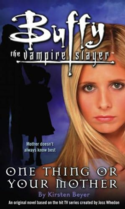 One Thing or Your Mother is the best Buffy tie-in novel that I have ever read. Well done, Kirsten Beyer! I’m sorry that, as this is also the last Buffy tie-in novel to be published, you never got to write another one.
One Thing or Your Mother is the best Buffy tie-in novel that I have ever read. Well done, Kirsten Beyer! I’m sorry that, as this is also the last Buffy tie-in novel to be published, you never got to write another one.
Set between “I Only Have Eyes for You” and “Go Fish,” One Thing or Your Mother finds Buffy contending with several different problems. Aside from the recurring menace of Angelus, there’s the fact that Joyce has been contacted by the school about her daughter’s poor grades (with the end result that Buffy acquires a tutor), the disappearance of a young girl followed by sightings of a child vampire, and the strange behavior exhibited by Principal Snyder that ultimately imperils the whole town. True, none of these elements is particularly exciting, but each is competently executed, and done in a way that has bearing on what’s going to happen next in the series.
Where Beyer really shines is in capturing the characters—not just in dialogue, at which she admittedly excels, but in thought as well. Too many times to count, the thoughts attributed to Buffy and the others in these books have been downright insipid, but not this time. In addition, the scenes with the Scooby Gang together in the library are so spot-on they’re just about episode quality. Granted, this doesn’t match up to the very best of Buffy—a lot of which can be found in season two—but with a little reworking and simplifying, this could’ve made a solid episode better than the worst of Buffy—some of which can also be found in season two. I also thought Beyer did a great job with Spike.
Perhaps once I’ve completed this project I’ll have to come up with the Top Ten Buffy Novels for those who only want to read the cream of the crop. One Thing or Your Mother has definitely secured itself a spot on that list.
Portal Through Time by Alice Henderson
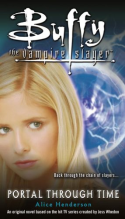 Set between “Bad Eggs” and “Surprise,” Alice Henderson’s Portal Through Time evidently takes place very early in 1998, because Buffy is still sixteen (she turns seventeen on January 19th) and Angel has not yet lost his soul. A vampire called Lucien has done a lot of research into time-traveling magic and recruits some assistants to help him with his plan: go back in time and kill four very famous Slayers so as to disrupt the line and allow the Master (of whom he is a devotee) to rise unimpeded. Angel gets wind of the plan, so Buffy and pals end up traveling to Wales in 60 C.E., to Sumeria in the time of Gilgamesh, to Tennessee during the Battle of Shiloh, and to Paris during the French Revolution.
Set between “Bad Eggs” and “Surprise,” Alice Henderson’s Portal Through Time evidently takes place very early in 1998, because Buffy is still sixteen (she turns seventeen on January 19th) and Angel has not yet lost his soul. A vampire called Lucien has done a lot of research into time-traveling magic and recruits some assistants to help him with his plan: go back in time and kill four very famous Slayers so as to disrupt the line and allow the Master (of whom he is a devotee) to rise unimpeded. Angel gets wind of the plan, so Buffy and pals end up traveling to Wales in 60 C.E., to Sumeria in the time of Gilgamesh, to Tennessee during the Battle of Shiloh, and to Paris during the French Revolution.
Sometimes being a reviewer (or at least being one who sets geeky goals) means reading things so that others don’t have to. Such is the case with Portal Through Time. Although there are some things Henderson does well—I like her attempts to recapture the feel of the show by employing quick cuts between scenes to humorous effect, for example—the overall concept of a magical means to travel back in time is just not very well thought out.
For one, if such magic did exist, you can bet that Willow would’ve used it to wipe out Warren before he could do harm to anyone she cared about. And two, even within this book there are complications and possibilities that are not pursued. Near the end, for example, Buffy stakes Angelus and then reuses the incantation to go back in time to the same spot and keep that from happening. So why does everyone seem so secure that once they’ve thwarted the vamps in a given time period the Slayer is now safe? The vamps could just go back and try again!
On top of this, Henderson’s writing is frequently redundant, like when she reiterates several times that if the vampires arrive at their destination during the day they will have to wait until nightfall to take action, and sometimes just plain bad. During an interminable passage in which Buffy is creeping through the woods around the perimeter of Shiloh, she ends up getting shot in the leg and suddenly develops a fondness for deer. Behold:
She forced herself to focus on the grand trees and shadowed valleys, golden fields in which the deer gathered at dusk… She imagined the fields and groves of trees without the thousands of bleeding and broken soldiers, but instead full of foraging deer and black bear.
I should not be snickering when there are thousands of bleeding and broken soldiers in a scene. And maybe you see nothing wrong with that quote, but to me it sounds nothing like Buffy and is just the author clumsily inserting an anti-war message.
Sometimes it can be fun to read a lousy book, but in the end this one is just too long and boring for me to recommend doing even that.




These writeups are a lot of fun – Buffy was a truly great show. However, there’s one friendly suggestion I’d make for your reviews here. The references these books make to show continuity are for some fans (like me) the best parts. Those are the reasons I’d read these tie-ins. You kind of spoil them here. Maybe spoiler tags?
Y’know, it’s true that figuring out where they fit *is* something I find fun, and it had never occurred to me I was ruining the fun for others! I’m sorry about that. Rather than spoiler tags, what if I put a warning in the intro paragraph to skip the first paragraph for each book if you want to work out for yourself where it fits in the continuity?